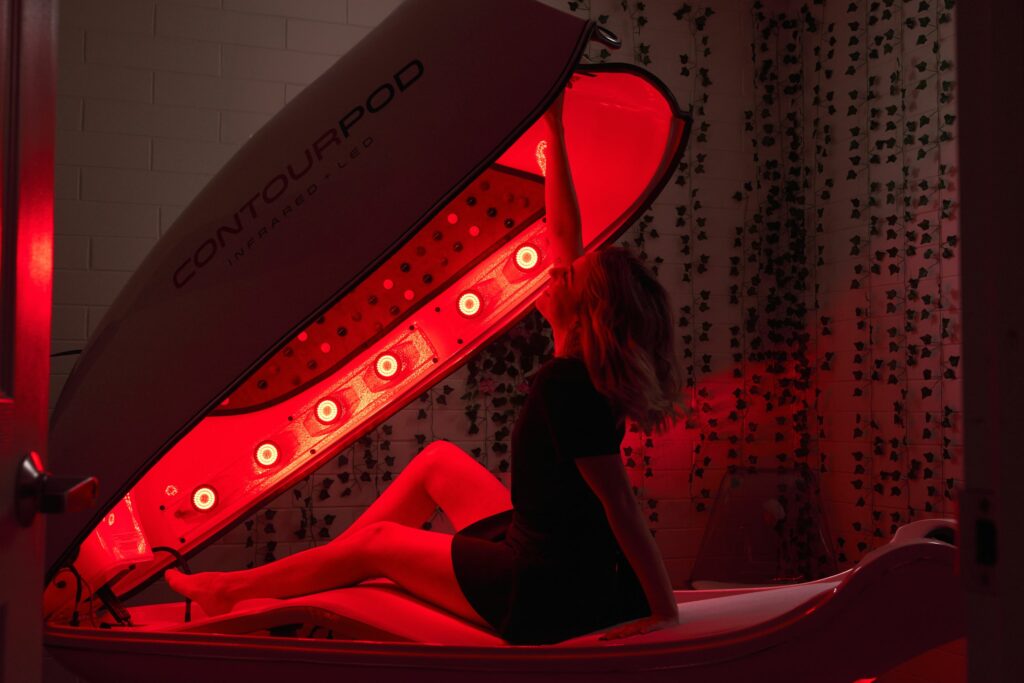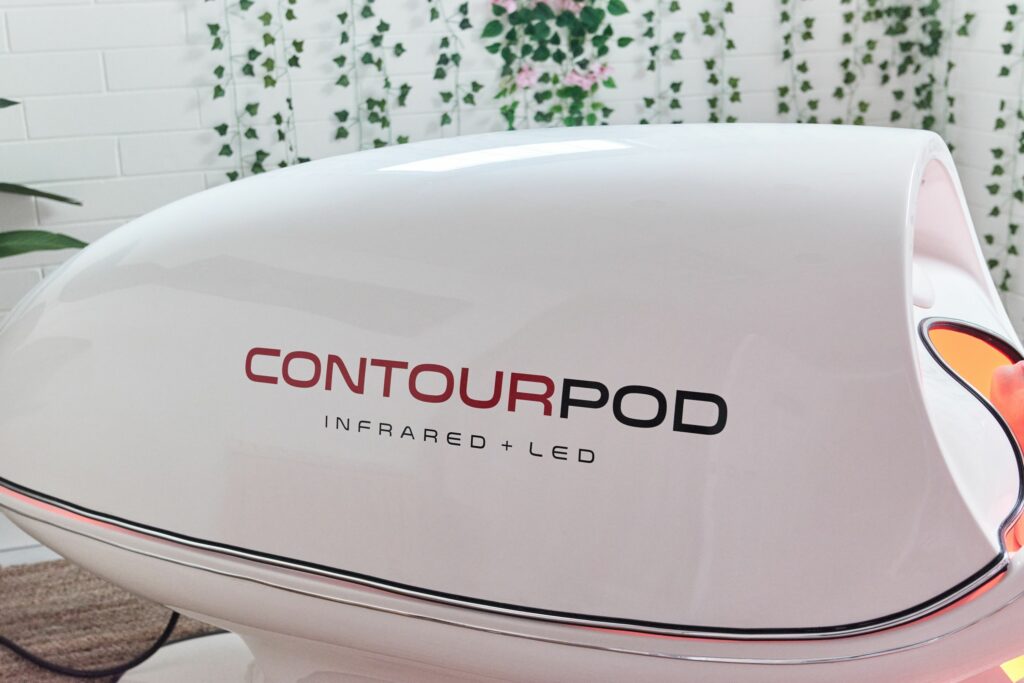Imagine stepping into a haven of warmth that promises not just relaxation, but a myriad of health benefits.
Infrared saunas are rapidly gaining popularity as a go-to wellness tool! But you may be asking…what is an infrared sauna?
By the end of this comprehensive guide, you will be equipped with all the knowledge to embrace the future of relaxation and rejuvenation.
What is an Infrared Sauna?
Infrared saunas are therapeutic heat environments, outfitted with specialized infrared heaters that have a unique impact on our well-being.
These saunas produce far-infrared heat—this kind of heat is not only akin to the sun’s gentle warmth, but also is a type that our bodies naturally emit.
What sets the experience apart is the targeted nature of the heat, which encourages your body to start sweating at temperatures of around 100°F to 130 °F.
These adjustable, milder sauna session temperatures are not only tolerable but have been suggested to allow for prolonged sessions if desired, maximizing potential health benefits and therapeutic effects on the body.
How do Infrared Saunas Work?
Infrared saunas operate on a different wavelength than regular saunas—quite literally.
Infrared lamps emit electromagnetic waves that apply heat directly to the skin. This direct application facilitates a deeper warming of bodily tissue.
Instead of steam or the dry heat, the infrared experience involves a gentle warming, encouraging a natural perspiration process.
This mimics the therapeutic effects of sunlight—without the harmful ultraviolet rays—making for a soothing, yet invigorating session.
The expansion of blood vessels and the resultant increase in heart rate mirrors the benefits of a mild workout, thereby offering a multitude of health benefits.
Benefits of Using an Infrared Sauna
As your body’s temperature rises, blood vessels dilate, allowing for easier flow and delivering more oxygen throughout your body.
With regular infrared & LED treatment, this gentle yet effective stimulation of the cardiovascular system supports overall heart health resulting in a numerous amount of benefits:
Relieves Muscular and Joint Pain
The therapeutic heat from an infrared treatment reaches deep into the tissue, addressing muscle soreness and joint discomfort pain at its source.
The soothing warmth promotes blood circulation, which carries away metabolic waste products and delivers oxygen and nutrients to reduce pain and speed healing.
Whether it is chronic pain from conditions such as arthritis, or temporary soreness from intense physical activity, the deep penetration of infrared rays can offer substantial relief and diminish recovery time.
Detoxification and Improved Skin Health
Infrared lights excel at detoxification!
By stimulating sweat glands, they facilitate the expulsion of accumulated toxins and heavy metals.
Further to this, they also encourage cell rejuvenation, leading to healthier skin.
As these saunas promote sweating and increased blood circulation, pores are cleansed leading to:
- clearer complexion
- reduced wrinkles
- improved skin tone.
For those concerned about the effects of environmental pollutants and skincare products, infrared sauna therapy can be especially beneficial in maintaining healthy, glowing skin.
Stress Reduction and Mental Health Benefits
Infrared treatments experiences aren’t just good for the body; they benefit the mind, too.
By activating the body’s parasympathetic system, the sauna encourages deep relaxation, providing a peaceful reprieve from the stresses of daily life.
Regular use has been connected with decreased rates of depression and anxiety due to the release of endorphins, the body’s natural feel-good chemicals.
In addition, the soothing warmth can improve sleep patterns, leading to enhanced mental clarity and mood.
Taking the time to unwind in the comforting embrace of an infrared sauna can be a grounding wellness practice for mental and emotional health.
Enhanced Energy Levels and Muscle Recovery
Athletes, fitness enthusiasts, and those with physically demanding lifestyles will appreciate the energy-boosting and muscle-recovery advantages offered by infrared treatments.
By improving circulation, the heat aids in the rapid repair of muscle tissue, thus decreasing downtime and enhancing overall performance.
Pre-workout sessions in the sauna serve to warm up the muscles, increasing flexibility and reducing the likelihood of injury.
Post-workout, the deep heat helps to relax the muscles, dissipate lactic acid, and repair muscle fibers.
These benefits contribute not only to individual workouts but also to consistent, sustainable energy levels throughout daily life.

Are Infrared Saunas safe?
Infrared Saunas are considered very safe for most individuals.
Awareness of the dangers of dehydration can’t be overstated, but these side effects are preventable with efficient hydration methods.
For pregnant women, the intense heat can pose a potential risk to the fetus, making it essential to seek medical advice before use.
Additionally, individuals with heart conditions should exercise caution. The heat could exacerbate heart disease or cardiovascular conditions.
Moreover, those with implanted medical devices, such as pacemakers, need to consult with their healthcare providers. The infrared spectrum can interfere with the functionality of certain devices, making prior medical consultation a necessity.
Users with skin conditions like eczema should be aware that infrared treatments could dry out the skin, possibly leading to discomfort.
Given these considerations, it is vital for anyone with medical conditions to get a doctor’s approval before enjoying the potential benefits of infrared therapy.
How Does an Infrared Sauna Session Work?
Wondering what a regular infrared & LED treatment at Contour Spa would look like? Let us take you through our process:
Setting the Right Temperature and Time
When it comes to taking full advantage of an infrared treatment session while ensuring safety and comfort, setting the appropriate temperature and time is crucial.
Generally, starting at a lower heat range — between 100°F and 150°F — is recommended.
First-time users should aim for brief sessions of 10 to 15 minutes, gradually working their way up as their heat tolerance increases.
A full session typically lasts for about 20 to 30 minutes. Cranking the sauna up to its full 150°F capacity in increments.
With consistent use, people often discover that their body starts to sweat earlier and at lower temperatures compared to their initial experiences.
What to Expect During a Session
Venturing into an infrared treatment, expect the environment to be less scorching than traditional saunas.
During these sessions you might experience profound sweating indicative of an intense workout.
Comfort should be a priority during your session; wearing loose-fitting attire can enhance your relaxation and allow for better heat penetration.
Post-Sauna Care and Hydration
Post-sauna, the body continues to benefit from the session long after you’ve stepped out of the warmth.
To best maintain these benefits, immediate hydration is key.
Starting with a glass of water before entering the sauna and taking small sips during your session can help pace your hydration efforts. Once you’ve concluded, it’s crucial to further rehydrate, replenishing what was lost during sweating.
Lastly, a refreshing shower is not just about hygiene; it’s about preventing reabsorption of the toxins just released.
How to prepare for an Infrared Sauna Session
Embarking on the soothing journey of infrared therapy requires proper preparation to ensure both safety and maximum therapeutic benefit.
One of the golden rules of sauna therapy is to stay hydrated!
Proper Hydration and Drinking Water
Maintaining optimal hydration is non-negotiable in the context of infrared treatment.
Since infrared light promotes substantial sweating, replenishing lost fluids becomes a paramount concern.
Before stepping into the sauna continue to hydrate by drinking water uniformly throughout the day and having a glass or two just prior to your sauna session.
Once inside, it’s a good practice to bring water with you, sipping occasionally to avoid dehydration.
If at any point, you feel discomfort, dizziness, or faintness, it’s a signal from your body to exit the sauna and hydrate immediately.
For those who use the sauna regularly, daily hydration is just as important, if not more so, outside of the sauna.
Incorporating fluids and electrolytes into your routine sustains the body’s water balance and ensures that you’re prepared for the next session.

Infrared Saunas FAQs
Infrared treatments have become a popular choice for those seeking a type of sauna that employs the therapeutic use of light.
Understanding the common questions around their use can help you make informed decisions about whether they may be right for your health and wellness routine.
Below are some frequently asked questions about infrared saunas and their benefits!
How often can you use Infrared Saunas?
Contour Spa suggests using the sauna 3-4 times a week for maximum benefits, which generally provides a balance between obtaining benefits and allowing the body time to recover.
While some individuals might enjoy the sauna on a more frequent basis, even daily, beginners should ease into their routine starting with 2-3 times a week.
The key is to listen to your body and find a routine that supports relaxation and health without causing discomfort or stress.
Are Infrared Saunas hot?
Infrared saunas are known for their ability to provide heat in a more comfortable manner compared to traditional steam saunas.
This direct method of heating typically raises the body temperature by about 2-3 degrees Fahrenheit, resulting in a deep sweat without the discomfort of overheated air.
Do Infrared Lights cause Skin Cancer?
Studies have shown that the type of infrared light used in infrared saunas is not harmful and does not cause cancer.
Infrared saunas use the same type of heat as natural sunlight but without the ultraviolet rays that can cause damage to the skin.
Do Infrared Saunas help with Sinus Infections/Headaches/Arthritis?
Infrared saunas have been lauded for the potential relief they can provide for certain conditions.
While research is ongoing, there is some evidence that regular sauna sessions may help alleviate symptoms associated with sinus infections, headaches, and arthritis:
- Arthritis: Studies suggest that infrared heat can temporarily reduce pain and stiffness in conditions like rheumatoid arthritis and ankylosing spondylitis, providing relief to sufferers.
- Headaches: A specific study demonstrated a significant reduction in headache intensity following regular use of a dry sauna, pointing towards benefits for individuals with chronic tension headaches.
- Sinus Infections: While direct research on infrared saunas and sinus infections is limited, the heat from the sauna may help open up nasal passages and promote drainage, potentially providing symptomatic relief.
It’s important to note that while these findings are promising, individuals should consult with their healthcare provider before starting infrared sauna therapy, especially if they have chronic health conditions.
